 |
 |
| |
|
|
| |
|
|
| |
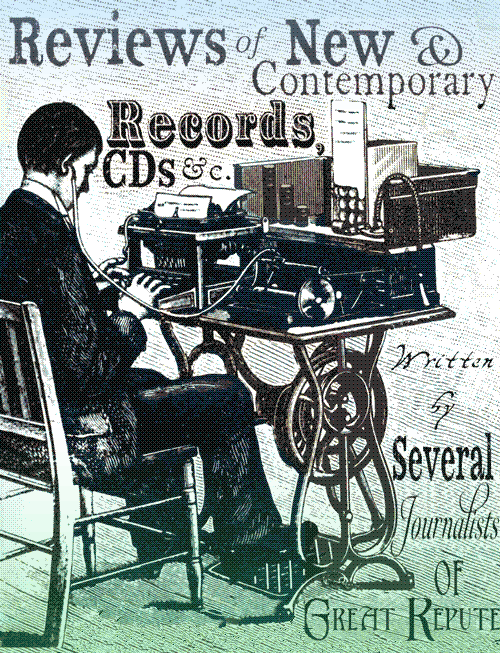 |
|
| March
= 2022 = |
|
|
| |
Rivers Flow Reverse
|
Arnald Paul
|
Dust Mountain
|
Gnod
|
Snowy
Dunes
|
Great
Lakes
|
Ghosts of Jupiter
|
Fever
Dog
|
|
|
|
|
|
|
|
| |
| |
| |
| |
| |
| |
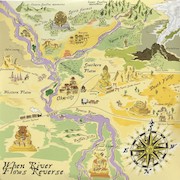
Home |
RIVERS
FLOW REVERSE - WHEN RIVERS
FLOW REVERSE
(LP
on Psychedelic
Source
Records
Twisted
Flowers 001)
This
is the first release from a new Greek record
label Twisted Flowers and is a double vinyl LP
by a Hungarian band made up of various members
of Lemurian Folk Songs and the Psychedelic
Source Family recorded in a shed in the middle
of a muddy forest somewhere in Hungary. The band
consists of Kristi Benus: vocals, Lörinc
Sántha:
vocals and banjo, Nico Delmas: trumpet, Gergely
Gerdolla: noises plus Bence Ambrus: guitar and
other instruments.
The
album which sounds very much like taking a slow
meander down some large river, unfolds
unhurriedly with the languid strains of opener
‘Leaving Shades Ahead’, and is unusual for a
psych folk song in that it features banjo. It
has some tasty, sparse electric guitar lead
lines and female vocals. Things turn very acid-
folk for the following ‘At The Gates Of The
Perennial’ in which the sounds of nature are
joined by would you believe pan pipes, but also
some fine arpeggio electric lead guitar notes
peeling off into the atmosphere, again it is
unhurried with plenty of space to develop, the
lightly marshalled drumming drives the song
along as it progresses to its conclusion some
ten minutes later.
‘El
Sendero’, is a lot shorter and has some fine
harmonics, this song ushers in ‘El Sendero parts
11 & 111’, which when all put together run
to over fourteen minutes, where mutant jaw harp,
found sounds, bells, chimes, drones and fine
electric guitar lines build in intensity to
create a song to get lost in, again the banjo
sounds misplaced, as indeed does the trumpet,
but they do make it different from the usual
psych album. ‘The Final Round’, greets weary
travellers with an invitation to take of your
muddy boots and join us for an invocation. A
sparse moody murder ballad, enlivened by
spiralling slide guitar notes which gradually
coalesce, building to intensity by the infinite
guitar playing and close-miked female vocals.
The
eleven minute ‘Rain It Rages’ again utilises the
template of trumpet, banjo and arpeggio electric
guitar as it slowly builds, it’s like Miles
Davis jamming somewhere in the Appalachians. The
song is again the acid- folk bag with female
vocals and features some cool electric lead
guitar playing off to the side. ‘Oriental
Western’ is a strange ghostly tune followed by a
slow and mournful ‘Ripples’ is introduced by a
clawhammer style banjo, it also has male vocals
which come as a bit of a surprise this late in
the proceedings, sounding not unlike Terrascope
favourites Stone Breath. The LP version adds
another couple of songs and has artwork by Tamás
Tόth.
(Andrew
Young)
|
|
|
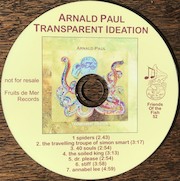
Home
|
ARNALD
PAUL –TRANSPARENT IDEATION
(10”
Lathe Cut + DVD from www.fruitsdemerrecords.com
)
Arnald
Paul wear’s his influences on his sleeves. They
are mostly English singer songwriters like Syd
Barrett and Robyn Hitchcock and is certainly
filtered through a sixties kaleidoscope.
The
record starts with backwards guitars and a
toytown Teardrop Explodes style on ‘Spiders’. On
‘The Travelling Troupe Of Simon Smart’, a
nursery rhyme deeply rooted in whimsical
Englishness, rendered on 12 string acoustic
guitar, strings and keyboards, a story of an
outcast and the various characters encountered
in an old travelling freak show.
Arnald
recorded these songs over the last thirty years
onto cassettes, they are home recorded on a 4
track cassette deck, not unlike the kind of
music made by Pig Rider. ’40 Souls’ highlights
this homespun way of recording, embellished as
it is with amateurish strings. ‘The Soiled
King’, shimmers with a neo psych style heavily
influenced by Syd Barrett, it’s a wonky
confection with spacey keyboards and is inspired
by Grimm's fairy tales.
Arnald’s
12 string guitar features prominently throughout
the record and forms the bedrock of the songs.
‘Dr Please’ one for the armchair traveller, my
mind goes high, Doctor please give me one more
dose! It ebbs and flows with a visceral, toytown
psych pop quality.
An
English folky melody is corrupted early on in
the following ‘Stiff’ by a dirty fuzzy electric
guitar riff as it heads off in a punky direction
before dissolving into chaos. The record ends
with ‘Annabel Lee’ ramshackle 12 string guitar,
slightly Eastern sounding motifs and wonky tape
loops, heavily influenced by Edgar Allan Poe,
Arnald sings about a mythical sea creature or
perhaps a haunting spirit.
It
is accompanied by a DVD entitled ‘Yellow Facet
Lime’; it consists of 20 videos, most of which
are brand new, created solely for this release.
The artwork is by Ian Barrett the nephew of Syd
and features an octopus with a lobotomised head,
so there.
(Andrew
Young)
|
|
|
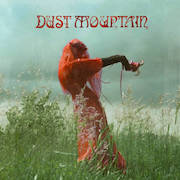
Home
|
DUST
MOUNTAIN – HYMNS FOR
WILDERNESS
(LP/CD/Digital
on Svart
Records)
This
is a terrific debut from Tampere, Finland-based
Dust Mountain. After
a first listen, I did something I rarely do,
which is immediately play the whole thing again,
and I wanted to do it a third time after that.
The album features female vocals, with
English-sung lyrics laced with pagan imagery (as
one glance at Tekla Valy’s cover art will also
affirm). But
while most records in that thematic area tend to
fall into either the hauntological folk or doom
metal categories, Dust Mountain is neither of
those. Braced
with electric guitars, flute and Mellotron, one
might suggest progressive rock, but it isn’t
that either; this is rock with a melancholy, and
not heavy feel.
Some bands I’d (lightly) compare it to
include Coven, Purson, Blood Ceremony, and very
distantly, Heron Oblivion.
The
band is co-honchoed by brother and sister Toni
(keyboards, mandolin) and Henna Hietamäki
(lead
vocals), who wrote all the songs together.
All the members hail from a multitude of
Finnish bands, the most famous of them being
Hexvessel. Henna
Hietamäki’s
vocals blend perfectly with harmony singer and
guitarist Pauliina Lindel’s (they used to sing
in the same choir as children).
The
subject matter sprinkled throughout indicates
that something sinister may be afoot in the
fields of Finland.
Witchy rites, Aleister Crowley’s black
magick, and of course old Lucifer himself get
nods. And
if they ever decide to film a sequel to Midsommar,
Dust Mountain could make a fine soundtrack.
Only the song “Apollo” trades in the
pagan robes for Greek mythology in the heaviest
track on the album.
Henna Hietamäki
told Echoes and Dust “I’m really interested in
folklore and old traditions; pagan-rooted
Finnish traditions that have been mostly
forgotten. I’ve
also been interviewing some shamans working in
Finland and I’m really appreciative of their
thoughts…”
Hymns
for Wilderness abounds with superb songwriting,
arrangements and production all around.
The sound of the album is just
sensational, with a warm, full, analog feeling.
The tracks are all killer, no filler.
There’s not a dud in the bunch.
My favorite is “Village on Fire.”
It’s the rockingest track on the album,
about “burning down unjust kingdoms.”
The propulsive rhythm, with mandolin and
electric guitar riffing away, really gets the
blood pumping. But
it’s the long outro, with an extended build
featuring Henna Hietamäki’s
and Pauliina Lindel’s vocals, plus soaring
Mellotron, that positively induces goosebumps.
The song is only 5:50, but I think I
could listen to that explosive outro for about a
half hour.
The
band is super-tight, which I suppose is
unsurprising, considering the number of other
bands from which its members came.
And Toni Hietamäki
really
knows his way around a Mellotron, which elevates
many of the tracks.
Hymns for Wilderness has duly vaulted
into being one of my recent favorites.
(Mark
Feingold)
|
|
|
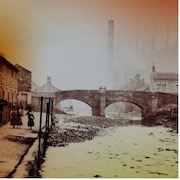
|
GNOD
- HEXEN VALLEY
(LP/CD/DL from Music
|
Rocket Recordings (bandcamp.com))
Recently
decamped
to Hebden Bridge (the Hexen Valley of the
title and, for the uninitiated, a more
rugged Glastonbury of the North) and with a
line-up still coalesced around Founding
Fathers Paddy Shine and Chris Haslam, Gnod
reprise the communal approach with which
they were first associated at Salford’s
Islington Mill. It’s a formula that
succeeded well enough then, and it sure
bears fruit now.
Gnod’s
last
album, La
Morte du Sense, doubled down on the
aural bombardment that has served them so
well in recent years and which as good as
nailed it on that occasion, too. Now
stripped back to a four-piece featuring two
guitars, bass and drums, one might
reasonably expect to again be on the
receiving end of a bare-knuckle pasting. And
to an extent we are, except that Hexen
Valley introduces us to a few more
jabs and feints, even a hint of fancy
footwork to keep you guessing. Which of
course makes it all the more delicious when
you do get floored. Boy how we love a sucker
punch - fall for it every time.
From
the
jagged, “Rhubarb and Custard”-style
beginnings of ‘Bad Apple’ we know we’re in
for a treat. Gnod are not famed for
conventional vocal prowess but here a
talking narrative, accompanied by yelps
seemingly from deep within a rancid barrel
of the rotting fruit, effectively make the
point. A rasping bass riff and squall of
feedback heralds ‘Spotlight’, a fifteen
minute off-centre centrepiece showcasing
Gnod at their most gloriously attritional
and teetering on a narrow bandwidth that
proves again the old adage of less is more.
A distant voice occasionally calling
from the void over a steady 4/4 rhythm
constitutes something of a breather and then
it’s back on your heads.
New
man
Richard Chamberlain brings to the party a
great line in take-note guitar intros, upon
which several cuts hitch a ride. ‘Skies are
Red’ is no exception, propelled too by high
octane lung busting rants and Jesse Webb’s
machine gun drumming, so powerful and
precise that it sounds like he’s somehow
cloned himself. The brooding
‘Antidepressants’ packs a woozy, cloying
bad-batch psychedelic quality, incessant
keyboard plink and stoner vocals that have
you metaphorically bumping into walls as you
stumble rubbery-legged down an endless
ill-lit corridor. A rumbling bass and
shrieking feedback shakes us out of a dark
reverie and it’s time for those legs get to
mosh again. Really? At my age? Aw,
c’mon...oh alright then. Then the
dissociative Ketamine vibe kicks back in
again, and we all fall down. And dribble. It
certainly has me licking the blister pack
for more.
What
else?
Well, a pathological aversion to “drop g”
song titles was tested by ‘Start Runnin’’.
Thankfully it has the redeeming quality of
sounding like a spirited if hyperactive
first cousin of ‘Death Valley ‘69’ or indeed
any other example of the more corrosive 80s
Sonic Youth oeuvre that takes your fancy.
And finally there’s the curveball, the
shimmy, as “Gnod do Lou Reed”. Yes,
seriously. One of the Velveteer’s heavier
outings, ‘Waves of Fear’ is given extra heft
and a suitably emotive vocal delivery that
work brilliantly. Describing Reed’s
withdrawal (and in Lou’s case no doubt with
drawl) from drug addiction, taken out of
context the catharsis may be a little lost,
but this is an absolute triumph to be sure.
An album of Adele’s break-up songs must
surely be on the cards now.
Gnod
and
Hebden Bridge, a strange band in a strange
land - a Paradise Rust where the old mills,
once dark and satanic, grind to new metallic
rhythms. Long may they, and we, linger
there.
(Ian
Fraser)
|
|
|
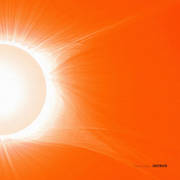
|
SNOWY
DUNES - SASTRUGI
(bandcamp)
This
third album by Stockholm’s Snowy Dunes is not
what it initially seems – well, not exactly.
The four-piece begins the album and title
track with several minutes of gutsy, bluesy,
fuzz and wah-wah filled hard rock reminiscent of
1970-era Taste, Uriah Heep, The Third Power, Sir
Lord Baltimore, High Tide, etc.
That is, until they take an unexpected
left turn into the middle of a spaghetti western
for a spell, before settling into half-speed
version of the hairy head-nodding rock with
which they started.
This
sets the general course for Sastrugi, the album.
(Sastrugi are not Italian pastries, but
rather wind-blown ridge lines in, um, Snowy
Dunes.) You’re
in for a tour of hard psych, proto-metal, hard
rock – choose your bloody moniker – styles and
their extant variations.
And Snowy Dunes does it with expertise
and style, lots of style.
On
next track “Let’s Save Dreams,” Snowy Dunes
enlists a little help from their friends Alex
Gatica (keyboards, acoustic guitars, backing
vocals) and Adele Friberg (additional vocals).
There are some Jon Lord-esque organ stabs
for an early Deep Purple vibe, plus an electric
sitar I found somewhat out of place (your
mileage may vary), but overall, another superb
track.
On
“Great Divide,” Snowy Dunes slows things down –
at first – again.
Keyboard and bass player Carl Oredson
adds Mellotron to what starts to shape up to be
a laid-back ballad.
Until, that is, the “Great Divide” opens
up a few minutes in, when singer Niklas Eisen
clears his pipes and the song morphs back into
melt-the-paint-off-the-walls heavy psych
territory. The
Dunesmen keep this slow-fast, light-heavy
back-and-forth thing going at a dizzying clip
throughout the track.
They are excellent at utilizing
light-and-shade over the course of their songs,
keeping the listener constantly guessing, but
always with strong melodies.
The
final two tracks are both lengthy trips, the
nine-minute “Medicinmannen” and eleven-minute
“Helios.” On
“Medicinmannen” Eisen switches to his native
Swedish, while guitarist Christoffer Kingstedt
gets several opportunities to shine in a wah-wah
induced frenzy, and Oredson contributes more
Mellotron and spacy synths.
The band makes the most of the extra time
to jump back-and-forth between slow/light and
fast/heavy sections.
Closer
“Helios,” begins like a Zeppelin-inspired
electric delta blues track that could’ve easily
slotted onto Led Zeppelin I.
But you just know the eleven-minute
length is going to be filled with lots of
excursions off the beaten path.
There are hints of The Doors, and a
lengthy lysergic departure.
Guitarist Christoffer Kingstedt again
lends a forceful dynamic to counter Eisen’s
powerful vocals.
If
you like songs from collections like the I’m
a Freak Baby or the Brown Acid
series, Snowy Dunes is for you.
But it goes well beyond those mileposts,
with the band never sitting still in any given
track, constantly changing up (or down) the
tempo and VU-meter levels.
Vocalist Niklas Eisen has a mighty voice,
letter perfect for this style of rock, while
guitarist Christoffer Kingstedt and
bass/keyboard player Carl Oredson add plenty of
their own muscle.
Turn it up.
(Mark
Feingold)
|
|
|
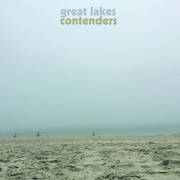
|
GREAT
LAKES - CONTENDERS
(LP
on Happy
Happy Birthday To Me)
Singer/songwriter
Ben
Crum has been spearheading Great Lakes for over
two decades, orbiting the Elephant 6 collective
with Terrastock performers Andrew Rieger and
Adrian Finch (Elf Power) and Jeremy Barnes and
Scott Spillane (Neutral Milk Hotel) contributing
to his eponymous 2000 debut (Kindercore). Barnes,
Spillane, and the late Bill Doss (Olivia Tremor
Control) also help out on 2002’s follow-up The
Distance Between (Orange Twin). 2010 saw
drummer Kevin Shea and vocalist Suzanne Nienaber
join Crum (guitar, bass) to solidify the current
lineup and Contenders
is their fourth release together.
The dirgey ‘Eclipse This’ seems
COVID-inspired, a claustrophobic trawl through
barbed wire and dusty, deserted landscapes. “And
nothingness speaks to what might be/Come into
being.” Existential angst with a three-martini
hangover. Neil Young and Crazy Horse influences
seem at the heart of ‘Way Beyond The Blue’, all
fuzz petals, drawling vocals, and sinewy melody
lines with signpost lyrics like “Come let us smoke
together” pointing the way!
The hypnotic sludge of ‘Easy When You
Know How’ is elbowed aside by the insanely
magnetic country rocking toetapper ‘Baby’s Breath’
and the jingly-jangly good timey ‘Last Night’s
Smoke’ which will induce drooling nods and illegal
smiles amongst Mike Ness and Camper Van Beethoven
fans. The fun continues on the philosophical ‘I’m
Not Listening’. Shea’s galloping drums (Gary
Glitter-meets-Adam & The Ants) are at the
heart of Crum’s multifaceted lyric of broken
relationships, canceled TV shows, aging pop stars
past their sell-by date, and “every picture tells
a story” revisionist history.
While the world may not be ready for the
swaying doo-wop of ‘Born Frees’, its nostalgic yen
for more innocent days is refreshing, and the
intimate, soothing nodder ‘Wave Fighter’
spotlights Nienaber’s delicately lilting delivery.
The set wraps with the heavy-lidded ‘Your Eyes Are
Xs’, which sounds exactly like what it says on the
tin!
If you haven’t investigated the
kaleidoscopic crystalised third-eye musical mind
of Ben Crum and the Great Lakes, Contenders
is a great place to start your trip.
(Jeff
Penczak)
|
|
|
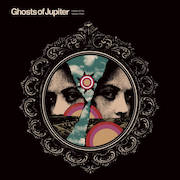
|
GHOSTS
OF JUPITER – KEEPERS OF
THE NEWBORN GREEN
(CD/Digital
on bandcamp)
Boston-area
nu-psych band Ghosts of Jupiter is led by
multi-instrumentalist and songwriter Nate
Wilson. On
this, their magnificent third album, their brand
of melodic psych is also home to some ace
songwriting and playing by the band.
Ghosts of Jupiter reminds me in some ways
of the Swedish band The Greek Theatre and also
Communicant, which we reviewed back in October,
for their extreme reverence to a strong melody,
and a fine band to back up the sound.
I also hear a touch of Fleet Foxes in the
air. On
many of the songs Wilson takes sharp aim with
his pen at the things poisoning our contemporary
society.
The
first things you notice when you hit Play are
Nate Wilson’s dreamy tenor and harmonies, and
his fine flute work in the psych folk of “The
Undertaking” and “Villains.”
But this isn’t dream pop; you’re in for
an album with loads of variation.
“On
Bending Tides,” about trying to find one’s way
in a world knocked off its axis, adds a bit of
muscle, as the band pulls more of the wraps off
Thomas Arey’s drum kit and adds a powerful
guitar solo.
The
album contains several peak instrumentals parsed
between tracks, all of them stylistically
different. But
the key to each of them is once again their
incredible tunefulness.
“The Wandrian” mixes slide guitar, piano,
organ, flute, glockenspiel and synths in a rock
and prog voyage.
“Battlekat” is a slowly simmering pot of
analogue synths, organ, flute and electric
guitar, while “Gustav” brings the funk, rock,
jazz and prog in a sweeping mélange.
On
“Northern Road,” which seems to be about the
madness surrounding many toxic political rallies
and demonstrations, which continues to plague
our times, there’s a lovely interlude of flute
and Mellotron to counter the darkness of the
lyrics. Although
I wish that stretch would’ve lasted longer, even
for the backing of the entire song, the track is
practically flawless nonetheless.
“Sea
of Madness” isn’t the Crosby, Stills, Nash &
Young song of the same name – but its
sensibility is such that it could’ve been by
them anyway. The
rocker seems like a barb at the misinformation,
disinformation and lies spread by conspiracy
theorists.
“Imperium
Waves” just rocks, and closer “No Direction” has
some great harmonies.
It tells us we may all be adrift, but the
refrain “we’re going home” repeats towards the
end, though we may not know where that exactly
is any more.
While
plenty of artists have covered the insides and
outs of the pandemic and its short-term and
lasting effects, I was very pleased to see
someone finally willing to take on that other
thing lately plaguing us, which is us.
It’s easy to lose that bubble on Keepers
of the Newborn Green, because Ghosts of Jupiter
have an often-sweet sound, enhanced by Nate
Wilson’s soft vocals.
They add some edge with a very polished
and professional sound and a well-rounded mix of
styles and instrumentation.
You can easily lose yourself for a while
in this album, because musically it’s so strong,
one song after another, and you don’t want it to
stop. Finally,
the cover art by the great Robin Gnista lends
still more class to an already classy record.
(Mark
Feingold)
|
|
|
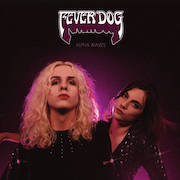
|
FEVER DOG – ALPHA WAVES
(LP/CD/Digital on bandcamp
and Glory
or
Death Records)
This very fun album is like one very
long sugar rush after
eating a lot of sweets.
Southern
California’s Fever Dog brings their third album
proper ‘Alpha Waves,’ and it’s
an overflowing bottle of 70s style AOR and glam
rock, well played, and I mean
REALLY well played.
The band is led by childhood friends
Danny Graham (guitar,
lead vocals) and Joshua Adams (drums, vocals),
both from the Coachella Valley, and
also includes Quanah Lienau (guitar) and Jaxon
Fischer (bass).
Graham and Adams have run this outfit in
one
form or another since they were around 12 years
old (they’re twenty-somethings
now).
Some of the songs on Alpha Waves are
clearly done lovingly in the
styles of their influences (“Bruiser!” is T.
Rex, “King of the Street” is The
Sweet). Most
of the rest is their own
amalgam, but in their tunes and arrangements
you’ll hear early Queen and ELO,
among loads of others.
That’s in the
vocal sections.
In the solos you’ll hear
four amazing musicians, more on that below.
The cover design by Danny Graham is all
about the androgynous glam.
But here’s the thing.
You come for the glam, AOR and power pop,
but you fall hook, line and
sinker and stay for their musical chops.
These guys’ playing is simply stunning.
Virtually every song has an extended
break where Fever Dog just crushes
it on guitars, organs and synths like Minimoogs.
They may be young, but these dudes can
play. You
need look no further than knockout
title track “Alpha Waves” to see what I mean.
Plus, their arrangements have lots of
excellent attention to detail,
like their backup harmonies.
While Fever Dog’s lyrics can often be no
more adventurous than
“Ooh, I got a hold on you” (an interesting twist
at least, since doesn’t the
sentiment usually flow the opposite direction in
pop songs?), it isn’t all it
seems on the surface.
“Star Power”
laments what it takes to make it in the biz and
how fleeting success can be, set
once more to the boys’ ultra-confident playing
on electric piano and guitars,
while title track “Alpha Waves” takes you “on a
quadraphonic starship ride.”
And on instrumental track “Mystics of
Zanadu”
they dispense altogether with verses and
choruses and let their axes and
vintage synths do the talking.
Fever Dog takes a genre in some ways
exemplified by The Lemon
Twigs, and ups the ante many fold (and the
D’Addarios are no slouches).
They worked on this album for five years
and
it shows. I
hope you’ll take a chance on
this record; you’ll be impressed at how
exceedingly likeable it is.
(Mark
Feingold)
|
|
|
|
|
|
|
|
|
|
|
 |
|

